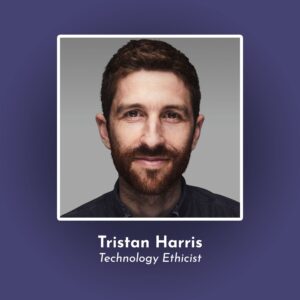
Ep 16 | Tristan Harris
Tristan Harris: “Social Media: Bringing the Ring to Mordor”
On this episode, we meet with Co-Founder of the Center for Humane Technology and co-host of Your Undivided Attention Podcast, Tristan Harris.
Harris explores the intersection of society and social media technology. How does modern social media pose an existential risk for society? How can we create a healthier, sustainable relationship between our social technology and culture?
Harris explains how privacy, liability, and antitrust could contribute to a healthier tech ecosystem. Why is it not enough to reduce the harm of technology, and how can we use technology to strengthen democracy?
About Tristan Harris
Tristan Harris has spent his career studying how today’s major technology platforms have increasingly become the social fabric by which we live and think, wielding dangerous power over our ability to make sense of the world. Along with Aza Raksin, he is the Co-Host of “Your Undivided Attention,” consistently among the top ten technology podcasts on Apple Podcasts, which explores how social media’s race for attention is destabilizing society and the vital insights we need to envision solutions. Tristan was also the primary subject of the acclaimed Netflix documentary, “The Social Dilemma,” which unveiled the hidden machinations behind social media.
In French, we have a motto that says that a simple drawing is often better than a long explanation. Jean-Marc Jancovici Carbone 4 President
That’s very understandable because with left atmosphere thinking, one of the problems is that you see everything as a series of problems that must have solutions. Iain McGilchrist Neuroscientist and Philosopher
We can’t have hundreds and hundreds of real relationships that are healthy because that requires time and effort and full attention and awareness of being in real relationship and conversation with the other human. Nate Hagens Director of ISEOF
This is the crux of the whole problem. Individual parts of nature are more valuable than the biocomplexity of nature. Thomas Crowther Founder Restor
Show Notes & Links to Learn More
Download transcript00:45 – Tristan Harris info, Center for Human Technology
02:33 – The Social Dilemma
03:24 – Facebook market stock
06:02 – Nate’s Book and Animated Videos
06:33 – Social Dilemma production team
07:34 – Race to the bottom of the brainstem for attention
09:03 – Tiktok automatic beautification
09:42 – Collective action problem
11:29 – Runaway growth imperative
12:20 – Captured facts and shared understanding/reality
14:33 – Tiktok surpasses Facebook for time spent on Android
15:22 – Externalities of digital infrastructure
16:55 – Walter Cronkite
17:47 – E.O. Wilson
18:07 – We were evolved for a different environment
19:04 – Fitness matters more than truth
20:06 – Energy blind
22:06 – Frances Haugen
22:18 – Parents in the age of social media
23:32 – Downward causation and the financial market
25:52 – Aza Raskin – infinite scroll + TGS Episode with Aza Raskin
29:15 – Highly intelligent species eventually try to understand themselves
29:47 – Loss aversion
32:29 – Frank Luntz
34:01 – Laura Borodinsky
34:25 – George Lakoff Metaphors We Live By
35:07 – Evolutionary Psychology
35:54 – Ontological design
37:23 – We assume others think like us – but they don’t
42:33 – Countries manipulating social media algorithms
45:55 – AI can predict big 5 personality traits based on mouse/eye movement
46:23 – AI can predict our micro expressions
49:23 – Tech Fiduciaries Act
50:17 – Stanford Marshmallow Experiment
51:08 – Superorganism
51:47 – Social media undermines mindfulness efforts
53:10 – More in Common
53:33 – Extreme voices and overrepresentation
53:50 – False beliefs between about opposing political parties
56:50 – Taiwan and digital democracy and online polling system
57:50 – Your Undivided Attention – Audrey Tang
1:02:52 – TGS Episode with Jamie Wheal
1:04:09 – Nate’s Earth Day Talks
1:05:48 – TGS Episode with Nora Bateson
1:09:57 – Don’t Look Up
1:13:49 – The Maybe Story
1:17:22 – Biden State of the Union







